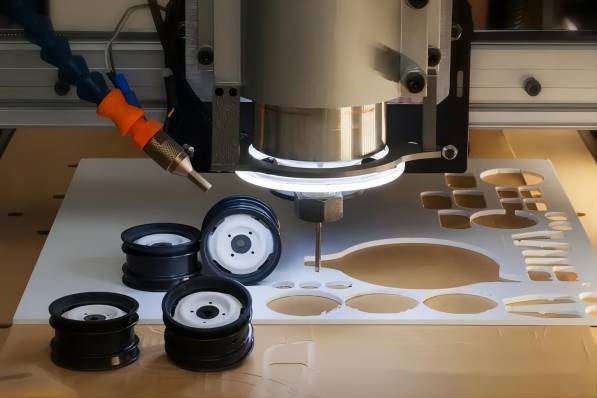
Privacy statement: Your privacy is very important to Us. Our company promises not to disclose your personal information to any external company with out your explicit permission.
What is ABS plastic?
Acrylonitrile butadiene styrene (ABS) is a thermoplastic polymer known for its excellent balance of material properties. It offers good toughness and chemical resistance, as well as a range of other customizable properties depending on the additives included in the chemical formulation of the plastic.
ABS plastics are made from a blend of three monomer components - acrylonitrile, butadiene and styrene - along with any other desired additives. The raw ABS plastic can then be melted and reshaped using injection molding, extrusion or 3D printing.
Precision machined ABS is an excellent choice for parts with strict quality requirements and tight tolerances. However, if you plan to machine your ABS manufacturing process, it is best to use machine-grade ABS plastic.
Benefits of ABS Plastic
Check CC Due to its perfect balance of properties, ABS plastic has a wide range of applications. Manufacturers who choose machined ABS plastics for prototypes and manufactured products can reap the following benefits:
Good impact strength
High toughness
Good chemical resistance
Good electrical resistance
Accepts a wide range of colors
Excellent manufacturability due to good relative heat resistance without excessive melting temperatures.
In addition, manufacturers can selectively enhance some of these qualities by varying processing temperatures and using specific additives. Some chemical additives can even help improve UV resistance or make ABS transparent.

The Challenges of CNC Machining ABS Plastic
Fork ABS plastic is obviously a valuable material, but using it to create high-quality, precision-machined parts requires the right equipment and expertise. Inexperienced machinists who don't have the right understanding of the machining process can easily damage ABS plastic parts. They may not even realize it until after they set the finished part aside.
As with other machined plastics, two very common machining defects in ABS plastics are distortion and poor surface finish.
Plastics with machining marks or shock lines will not meet surface quality requirements. In addition, any scratches and lines can make transparent parts appear blurry or cause ABS fittings to leak.
There are several factors that can negatively affect the surface quality of ABS plastic parts. Using the wrong cutting tool, using incorrect cutting parameters, and excessive heat buildup are a few common examples of surface damage on ABS parts.
Another common challenge with ABS plastics is preventing deformation. As opposed to commonly machined metals, ABS plastics experience significant thermal expansion when heated. This can cause inexperienced machinists to remove too much material, which can be noticeable as the part cools and shrinks.
If that wasn't enough, ABS plastic also has a relatively low heat deflection temperature and thermal conductivity. As a result, heat can build up quickly at the machining location, softening the plastic and causing it to deform.
Overall, this means that designers and machinists need to be careful when working with ABS plastics, especially for thin or complex parts that are prone to deformation.
5 Tips for CNC Machining ABS Plastic
To avoid defects when machining ABS plastic, manufacturers often use one or more of these tips to ensure high-quality results.
1. Use Machine Grade ABS Plastic
ABS plastics come in a variety of different grades with unique formulations optimized for extrusion, casting or machining. Always use machine-grade ABS plastic when milling, turning or drilling to ensure good chip formation and excellent surface finish.
2. Use the right cutting tools
Not surprisingly, tools optimized for machining high-strength steels and titanium alloys are not the best choice for ABS plastics. Machinists familiar with plastics processing will know how to select cutting tools designed specifically for plastics. It's also important to make sure these cutting tools stay sharp to prevent damage to the plastic surface.
3. Adjust your cutting parameters
A single cut that is too deep or too shallow can deform the part or cause machining chatter. Using the wrong cutting speed or feed rate can lead to excessive heat buildup, which can deform ABS parts. Unfortunately, finding the correct cutting parameters for your part primarily requires experience, but the quality improvements are worth the effort to optimize this part of the machining process.
As an added note, make sure that your machining setup holds the ABS part firmly without compressing it excessively, as this may result in distortion of the final part.
4. Use appropriate coolant
Without the use of coolant, ABS plastic may overheat and deform during the machining process. But not just any coolant will do.ABS plastic has good overall chemical resistance, but it can still be contaminated by coolants designed for metals or ceramics.
Most plastics require a non-aromatic, water-soluble coolant optimized for processing plastic parts. Plastic coolants can be applied in the form of pressurized gas jets, continuous mists, or flowing liquids, depending on the particular coolant used and the design of the part.
5. Annealing of ABS plastics
Unannealed plastic parts may have large internal stresses that are not apparent in stock materials. If the ABS material is heated during machining or use, these stresses may deform the final part, distorting its shape beyond tolerance limits.
By placing the ABS plastic in a heat treat oven prior to machining, the material can be heated slowly, held at annealing temperatures, and then cooled slowly to remove internal stresses.
LET'S GET IN TOUCH

Privacy statement: Your privacy is very important to Us. Our company promises not to disclose your personal information to any external company with out your explicit permission.

Fill in more information so that we can get in touch with you faster
Privacy statement: Your privacy is very important to Us. Our company promises not to disclose your personal information to any external company with out your explicit permission.